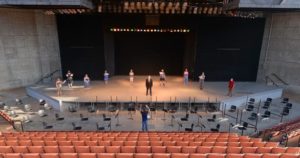
| Feature
Forging ahead in the pandemic, this Minnesota opera is built Iron Range-tough
For opera lovers, there has been little but bad news this summer. In Minnesota, both Mill City Summer Opera and the Lakes Area Music Festival in Brainerd were forced to cancel their productions. The excellent Des Moines Opera has scratched its summer stagings while New York’s Met and the Chicago Lyric Opera have gone dark until January at the earliest.
Is streaming online recitals or old productions the best that fans can hope for? Not if the Northern Lights Music Festival has anything to do with it.
Bucking a national trend of COVID-related cancellations, the Aurora, Minn.-based company is forging ahead with its 17th season on the Iron Range, which opens with outdoor concerts Saturday in Virginia and Sunday in Chisholm and continues through July 26.
It’s a bold, perhaps controversial decision, but not one taken lightly, said Veda Zuponcic, founder and artistic director of Northern Lights.
“Before we made our decision as a board, I sent out an e-mail survey to our audience, asking under what circumstances if any they would come to a performance. Ninety percent said they would come to an outdoor event, and very few said that attending would not be safe under any circumstances. So we moved forward on that basis.”
Born in Aurora, located about 60 miles north of Duluth, Zuponcic is a performer herself — she has an international career as a pianist and teacher — and had her fellow artists in mind when weighing options for the 2020 season.
“One of my primary goals with this festival has always been to support musicians,” she said. “We already had grants available from Explore Minnesota and the Minnesota State Arts Board” — but only if the festival actually happened.
“I just thought: If I can pull something together, no matter what shape or form, let’s spend that money and help our artists at a very difficult period.”
Safety precautions
An outdoor production of Puccini’s “Tosca” at the Discovery Center Amphitheater in Chisholm will be the main attraction.
This is “probably the first opera performed live with an audience present in the U.S. since lockdown,” said John Allison, editor of London-based Opera magazine.
A raft of measures have been taken to keep performers as safe as possible.
“There is definitely a bit of fear,” said Leah Crocetto, the American soprano playing Tosca, a singer tragically embroiled with the escaped political prisoner Cavaradossi. “But I feel as if the festival has done an excellent job of putting our minds at ease, and taking the necessary precautions to make this a successful run.”
So what will a socially distanced “Tosca” look like?
“For the big Te Deum scene in Act One, we’re rehearsing the chorus outdoors for a couple of days,” Zuponcic said. “Then we’re going into a large church with great spacing, small groups at a time,” to record the choir’s contribution.
In performance, the singers will mime to the recorded music, wearing face masks to further mitigate the possibility of airborne infection.
As for the 42-member orchestra, musicians will sit 6 feet from one another, with plexiglass barriers between them. String players will be masked and given their own music stands instead of sharing with a partner. Brass players are boxed off in a separate area, as their puffing and blowing makes airborne transmission of viral droplets more likely.
On stage, director Chía Patiño is blocking characters carefully. “No singer will be asked to do anything they’re not comfortable with,” Zuponcic said. “If they want 12 feet distance, they’ll get it.”
Even the climax of Act Two, in which Tosca kills the sexual predator Scarpia, will be COVID-compatible. “He’s going to get stabbed in the back, so they’re not breathing on each other,” Zuponcic said.
And what of the audience? Seating in the outdoor amphitheater has been sliced from 1,600 to 250. Seats will be assigned in advance, with appropriate distancing, and masks required.
Similar arrangements will apply to the other main events of Northern Lights — a smaller-scale, indoor production of Gian Carlo Menotti’s opera “The Medium” (July 26-27) at Ely’s Historic State Theater and a string of mini-chamber recitals (July 6-24) at the B’nai Abraham Cultural Center in Virginia.
Although Zuponcic confesses to nervousness about traveling into unknown territory, she is proud that her Iron Range festival is showing a possible way forward for opera in America, at a time when few if any companies are performing live with an audience.
“It’s like everything with this virus — if you want to do what you’ve been doing, just the same way you’ve been doing it, you simply can’t,” she said. “But if you want to have something rather than nothing, then all kinds of possibilities can happen.”